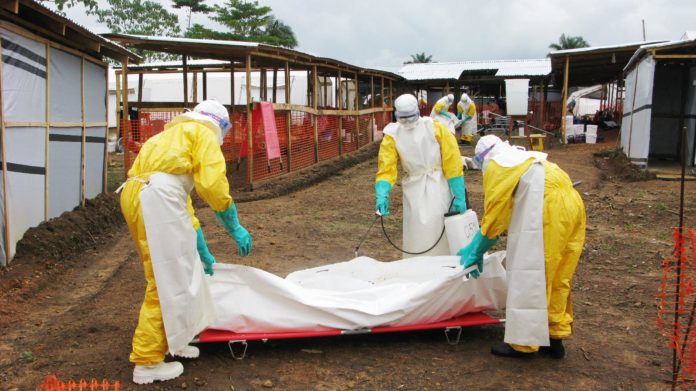
After testing swabs and tissue samples from the bodies of deceased Ebola-infected monkeys, scientists have determined that the deadly virus can stay alive for up to 7 days in a dead victim. They also found that non-infectious viral genetic material can remain for up to 70 days after death.
The research, published in Emerging Infectious Diseases, suggests that Ebola transmission from deceased individuals may be possible for an extended period of time following death, underscoring the importance of using safe practices for handling corpses.
The study also confirms that taking mouth swabs of bodies is a reliable and safer alternative for determining whether a person has died of Ebola than riskier procedures, such as tissue biopsy. Until now, the efficiency of detecting Ebola virus from corpse samples had not been systematically studied, say the researchers.
However, the authors also note that mouth swabs may not be a reliable diagnostic alternative to taking blood samples in the case of people who may have been in the early stages of Ebola virus infection when they died — presumably from other causes.
To stem an outbreak, it is important to determine whether people are carrying Ebola when they die, not only to assess the spread of the disease but also to decide whether it is necessary to trace the people they may have been in contact with, the authors explain.
Ebola virus was present in body surface swabs for up to 7 days after death
For the study, the researchers tested samples from five deceased macaques used in Ebola studies that were euthanized after showing signs of disease. They put the bodies in a chamber that simulated the environmental conditions in West Africa — the location of the current outbreak, which is the worst in the history of the disease.
Over a period of 10 weeks, the scientists took samples from seven body surfaces and four internal organs. Tests revealed that live Ebola virus was present in surface swabs for up to 7 days and in tissue samples of internal organs for up to 3 days after death. The team also found viral RNA in several swab and tissue types up to 10 weeks after death.
These findings may help to explain the rapid spread of Ebola in West Africa, where it is customary for members of a dead person’s family or community to be involved in the washing and handling of the body in preparation for burial.
When the body belongs to a victim of Ebola, this religious and cultural tradition can unfortunately help spread the disease. According to the World Health Organization (WHO), at least 20 percent of new infections occur during burials of people who died from Ebola.
The worst outbreak on record has now killed at least 9,177 people out of 22,894 recorded cases, mainly in the three worst-affected West African nations, Guinea, Sierra Leone and Liberia.
